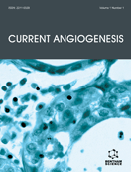
Abstract
Exosomes, a group of small vesicles (30-100 nm), originate when the inward budding of the endosomal membrane forms multivesicular bodies (MVBs). Exosomes are released into the extracellular space when the MVBs fuse with the plasma membrane. Numerous studies have indicated that exosomes play critical roles in mediating cell-to-cell communication. Also, exosomes are believed to possess a powerful capacity in regulating cell survival/death, inflammation and tumor metastasis, depending on the particular array of molecules contained within a particular population of exosomes. This mini-review will summarize dual roles of exosomes derived from different types of cells (i.e. endothelial cells, tumor cells, platelets, bone-marrow stem cells, cardiomyocytes, myocardial progenitor cells and among others) in endothelial cell proliferation, migration and tube-like formation. In particular, this review will focus on the therapeutic potential of exosomes as a natural nano-particle for delivering pro-/anti-angiogenic factors (proteins, mRNAs and microRNAs) into endothelial cells.
Keywords: Angiogenesis, cardiovascular disease, endothelial cells, exosomes, multivesicular bodies.
 17
17


